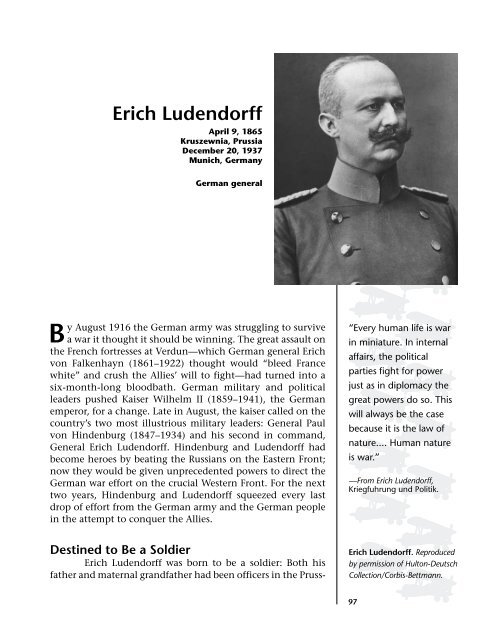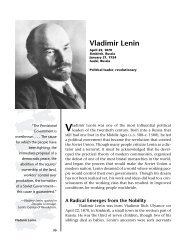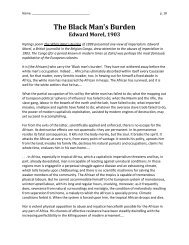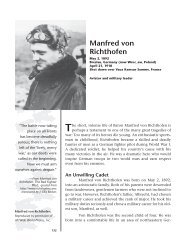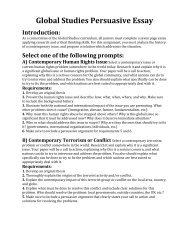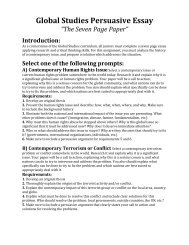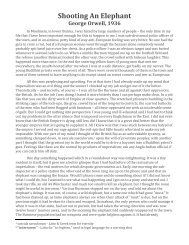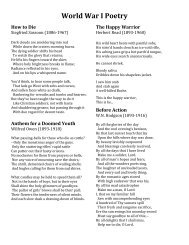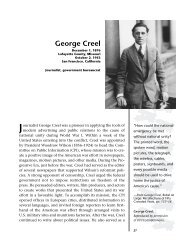Erich Ludendorff
Erich Ludendorff
Erich Ludendorff
Create successful ePaper yourself
Turn your PDF publications into a flip-book with our unique Google optimized e-Paper software.
<strong>Erich</strong> <strong>Ludendorff</strong><br />
April 9, 1865<br />
Kruszewnia, Prussia<br />
December 20, 1937<br />
Munich, Germany<br />
German general<br />
By August 1916 the German army was struggling to survive<br />
a war it thought it should be winning. The great assault on<br />
the French fortresses at Verdun—which German general <strong>Erich</strong><br />
von Falkenhayn (1861–1922) thought would “bleed France<br />
white” and crush the Allies’ will to fight—had turned into a<br />
six-month-long bloodbath. German military and political<br />
leaders pushed Kaiser Wilhelm II (1859–1941), the German<br />
emperor, for a change. Late in August, the kaiser called on the<br />
country’s two most illustrious military leaders: General Paul<br />
von Hindenburg (1847–1934) and his second in command,<br />
General <strong>Erich</strong> <strong>Ludendorff</strong>. Hindenburg and <strong>Ludendorff</strong> had<br />
become heroes by beating the Russians on the Eastern Front;<br />
now they would be given unprecedented powers to direct the<br />
German war effort on the crucial Western Front. For the next<br />
two years, Hindenburg and <strong>Ludendorff</strong> squeezed every last<br />
drop of effort from the German army and the German people<br />
in the attempt to conquer the Allies.<br />
“Every human life is war<br />
in miniature. In internal<br />
affairs, the political<br />
parties fight for power<br />
just as in diplomacy the<br />
great powers do so. This<br />
will always be the case<br />
because it is the law of<br />
nature.... Human nature<br />
is war.”<br />
—From <strong>Erich</strong> <strong>Ludendorff</strong>,<br />
Kriegfuhrung und Politik.<br />
Destined to Be a Soldier<br />
<strong>Erich</strong> <strong>Ludendorff</strong> was born to be a soldier: Both his<br />
father and maternal grandfather had been officers in the Pruss-<br />
<strong>Erich</strong> <strong>Ludendorff</strong>. Reproduced<br />
by permission of Hulton-Deutsch<br />
Collection/Corbis-Bettmann.<br />
97
ian cavalry. But <strong>Erich</strong> <strong>Ludendorff</strong> was not born to be a general.<br />
In Prussia (the dominant state in the cluster of Germanic states<br />
that would unify into the nation of Germany in 1871) generals<br />
came from the nobility. A person of noble birth was marked<br />
by the designation “von” before his last name. <strong>Ludendorff</strong>,<br />
born on April 9, 1865, was a commoner, raised in a struggling<br />
family that lived in the province of Posen. To reach the top of<br />
the German armed forces, he would have to work unrelentingly—and<br />
that is what he did.<br />
At the age of twelve <strong>Ludendorff</strong> entered cadet school at<br />
Holstein. <strong>Ludendorff</strong> was mocked by his fellow cadets because<br />
his last name lacked the “von” of nobility, and he was driven<br />
to his physical limit by the demanding Prussian officers who<br />
ruled the school. Perhaps because of these difficulties, <strong>Ludendorff</strong><br />
became ever more focused and severe, devoting all his<br />
waking hours to making himself the best possible soldier. After<br />
graduating from the Lichterfelde Military Academy in Berlin at<br />
the top of his class, <strong>Ludendorff</strong> won a commission as a lieutenant<br />
in 1882. Just twelve years later, after passing every test<br />
that was placed before him, <strong>Ludendorff</strong> was appointed to the<br />
prestigious German general staff, the group of officers who<br />
prepared war plans and strategy for the commanding general<br />
of the army. At the age of twenty-nine, <strong>Ludendorff</strong> had<br />
become one of Germany’s premier soldiers.<br />
“A Man of Iron Principles”<br />
For the next twenty years, <strong>Ludendorff</strong> devoted himself<br />
to understanding every area of the German military. In<br />
1908 he was appointed to lead the mobilization and deployment<br />
(gathering and transport of military supplies) division<br />
of the general staff, a position for which he had been trained<br />
by Field Marshal Count Alfred von Schlieffen (1833–1913),<br />
the mastermind of German war plans. <strong>Ludendorff</strong> longed for<br />
the day when his years of study and preparation would place<br />
him in the position of leadership that he felt he so richly<br />
deserved.<br />
<strong>Ludendorff</strong>’s years of devotion to the military had<br />
made him an unpleasant man. German officers were known<br />
for their arrogance and their rudeness to their subordinates,<br />
but <strong>Ludendorff</strong> was more rude and arrogant than most. Robert<br />
B. Asprey, author of The German High Command at War,<br />
98 World War I: Biographies
describes <strong>Ludendorff</strong> as “generally tense, cold as a fish, a monocled<br />
[an eyeglass for one eye] humorless eye staring from a<br />
heavily jowled red face as he barked orders in a high, nasal<br />
voice, his second (and later third) chin quivering from the<br />
effort. He was rigid and inflexible in thought, given to sudden<br />
rages, a table banger, frequently rude to subordinates, often<br />
tactless to superiors.” According to Red Reeder, author of Bold<br />
Leaders of World War I, <strong>Ludendorff</strong>’s medical director said that<br />
the general’s devotion to work was so intense that “He has<br />
never seen a flower bloom or heard a bird sing.” According to<br />
Asprey, <strong>Ludendorff</strong>’s wife described her husband as “a man of<br />
iron principles.”<br />
Trial by Fire<br />
<strong>Ludendorff</strong> greeted the coming of World War I in<br />
August 1914 with excitement and anticipation: He had been<br />
training for this moment all his life. Joining in the German<br />
effort to cross Belgium and storm into France, <strong>Ludendorff</strong> was<br />
made first quartermaster general. He was in charge of providing<br />
food, clothing, transportation, and supplies to the troops<br />
attacking the Belgian fortress city of Liège. Observing the battle<br />
from behind the lines, <strong>Ludendorff</strong> grew impatient when<br />
the superior German army could not break through the wellfortified<br />
Belgian lines. When a battlefield general was killed in<br />
action, <strong>Ludendorff</strong> moved to the front lines to take his place.<br />
Seizing a captured Belgian car, <strong>Ludendorff</strong> drove toward a<br />
small tower that the Germans had been trying to capture.<br />
According to Reeder, “<strong>Ludendorff</strong> jumped out. He drew his<br />
sword as if he were attacking the fort singlehanded. He<br />
pounded on the gate with the hilt of his weapon and shouted,<br />
‘Surrender! In the name of Kaiser Wilhelm.’”<br />
<strong>Ludendorff</strong>’s bold action energized the German troops,<br />
who soon overwhelmed the outnumbered Belgians. It also<br />
earned <strong>Ludendorff</strong> the nickname of “Hero of Liège” and a prestigious<br />
military medal, the Ordre pour le Mérite, from Kaiser Wilhelm<br />
II. Perhaps most important, <strong>Ludendorff</strong>’s leadership at<br />
Liège convinced Chief of the General Staff Helmuth Johannes<br />
von Moltke (1848–1916) that <strong>Ludendorff</strong>’s skills were needed<br />
in a spot where German soldiers were not faring so well: the<br />
Eastern Front.<br />
<strong>Erich</strong> <strong>Ludendorff</strong> 99
Paul von Hindenburg (left)<br />
and <strong>Erich</strong> <strong>Ludendorff</strong><br />
discuss strategy for the<br />
German army during<br />
World War I. Reproduced<br />
by permission of<br />
Corbis Corporation.<br />
Tannenberg and Beyond<br />
In August 1914, the Russian army had surprised the<br />
Germans with an unexpectedly strong attack on Germany’s<br />
easternmost province of Prussia, home of Kaiser Wilhelm II.<br />
Even worse, the German general in charge had panicked and<br />
ordered his army to retreat. <strong>Ludendorff</strong> seemed the perfect<br />
man to coordinate the troops and supplies that would be<br />
needed to stop the Russian advance. However, because he was<br />
not nobility, he could not command an army. So the German<br />
general staff tapped retired general Paul von Hindenburg to<br />
take the command, with <strong>Ludendorff</strong> as his chief of staff.<br />
Though the two men had never met, they soon learned to<br />
work together well: <strong>Ludendorff</strong> made all of the important<br />
plans and decisions, and Hindenburg gave the orders.<br />
Within days of taking charge, <strong>Ludendorff</strong> had reorganized<br />
the German war effort and launched an attack on the<br />
Russians. Exploiting Russian mistakes and a deep hatred<br />
between two Russian generals, <strong>Ludendorff</strong> and Hindenburg’s<br />
100 World War I: Biographies
troops soon routed the Russians, taking ninety thousand Russian<br />
prisoners and causing another fifty thousand Russian casualties<br />
in the Battle of Tannenberg. This battle was one of the<br />
most decisive victories in a war that soon became known more<br />
for its stalemates than for its dramatic triumphs. But <strong>Ludendorff</strong><br />
and Hindenburg did not stop there. For the next two<br />
years they drove Russian troops backward all across the Eastern<br />
Front, scoring a string of victories that stood in sharp contrast<br />
to the deadlock along the Western Front. By 1916 many within<br />
the German military believed that only Hindenburg and<br />
<strong>Ludendorff</strong>—widely known as “The Duo” or simply “HL”—<br />
could win the war on the Western Front.<br />
Total War<br />
When <strong>Ludendorff</strong> and Hindenburg were asked to lead<br />
the German war effort on the Western Front in August 1916,<br />
they were given unprecedented powers. Hindenburg was<br />
named chief of the general staff, and <strong>Ludendorff</strong> became his<br />
first quartermaster general—a title he preferred to “second<br />
general” because he did not want to be second at anything.<br />
The two believed that the only way to win was with the all out<br />
support of the entire German people and the fullest extension<br />
of German military efforts. With the kaiser’s support, <strong>Ludendorff</strong><br />
and Hindenburg schemed to remove any general or<br />
politician who opposed their plan for winning the war. By February<br />
1917 they had removed the statesmen who opposed<br />
unrestricted submarine warfare. In that same month they sent<br />
out German submarines to try to disrupt English shipping so<br />
severely that England would be driven from the war. By July<br />
1917 <strong>Ludendorff</strong> and Hindenburg told Kaiser Wilhelm II that<br />
he must get rid of the chancellor, Theobald von Bethmann<br />
Hollweg (1856–1921), who wished to negotiate for peace, or<br />
else they would resign. Bethmann Hollweg was forced out, and<br />
<strong>Ludendorff</strong> and Hindenburg assumed nearly complete control<br />
of the German government. From that point on, Germany was<br />
in essence a military dictatorship, with <strong>Ludendorff</strong> calling all<br />
the shots.<br />
<strong>Ludendorff</strong> and Hindenburg were not directly<br />
involved in planning battles, and they rarely traveled to the<br />
front to see soldiers in action. Instead they stayed at their comfortable<br />
headquarters and made plans that they asked others to<br />
<strong>Erich</strong> <strong>Ludendorff</strong> 101
carry out. In 1917, as the Russian government collapsed, they<br />
helped political leader Vladimir Lenin (1870–1924) enter Russia<br />
so he could lead a socialist revolution there. This was a<br />
strategic move by <strong>Ludendorff</strong> and Hindenburg since they<br />
knew that the socialists would not support the war. After leading<br />
a successful overthrow of the Russian government, Lenin’s<br />
negotiator, Leon Trotsky (1879–1940) signed a peace treaty<br />
with Germany in 1918 that removed Russia from the war. By<br />
eliminating the fight against Russia on the Eastern Front,<br />
<strong>Ludendorff</strong> and Hindenburg could turn their full attention to<br />
the fighting on the Western Front.<br />
The Last Offensive<br />
For spring 1918, <strong>Ludendorff</strong> and Hindenburg planned<br />
a huge German offensive that they hoped would finally force<br />
the Allies to retreat. <strong>Ludendorff</strong> wanted to strike quickly, before<br />
American forces could arrive to fortify the Allied troops. Beginning<br />
on March 21, 1918, the Germans launched their spring<br />
offensive with fierce attacks on the Somme River, the Belgian<br />
town of Ypres, and the Chemin des Dames. They had great success,<br />
pushing the Allies back more than forty miles in some<br />
places, but at a stunning cost—the Germans lost more than six<br />
hundred thousand men in less than three months of fighting.<br />
Even so, <strong>Ludendorff</strong> and Hindenburg ordered the onslaught to<br />
continue. Two more major assaults were launched in June and<br />
July, and both were disasters. The Allies stood firm and in some<br />
places pushed the Germans back. German soldiers, convinced<br />
that their leaders were sending them to slaughter, deserted in<br />
great numbers. By mid-July the German push had turned into<br />
a massive German retreat. On hearing of the setbacks, the German<br />
Chancellor, Georg von Hertling, wrote that “even the<br />
most optimistic among us knew that all was lost,” as quoted in<br />
Martin Gilbert’s The First World War.<br />
Though they were far from the battlefields, <strong>Ludendorff</strong><br />
and Hindenburg recognized that the end was near for the German<br />
war effort. According to James Stokesbury, author of A<br />
Short History of World War I, when <strong>Ludendorff</strong> learned of the<br />
German retreat in late July 1918, he went to see Hindenburg<br />
and asked him what Germany ought to do. “Do Do!” Hindenburg<br />
bellowed. “Make peace, you idiot!” But it was not that<br />
easy. <strong>Ludendorff</strong> knew that Germany needed to enter peace<br />
102 World War I: Biographies
negotiations in a position of power. To do so, they would have<br />
to hold their ground on the Western Front and convince the<br />
Allies that Germany was an equal in power and not a defeated<br />
nation. <strong>Ludendorff</strong> and Hindenburg tried to marshal the<br />
remaining German troops to keep the enemy from entering<br />
Germany.<br />
Through the late summer and into the early fall,<br />
<strong>Ludendorff</strong> and Hindenburg engineered a slow retreat in<br />
which the German army contested every inch of ground that<br />
they gave away. But with American troops adding fresh<br />
strength to the Allied line, the German cause was hopeless.<br />
<strong>Ludendorff</strong> grew increasingly distraught. According to Asprey,<br />
Hindenburg’s physician became “concerned with <strong>Ludendorff</strong>’s<br />
erratic ways marked by vicious outbursts of temper, restless<br />
nights broken by angry telephone calls to individual commanding<br />
generals, on occasion too much drinking, and crying<br />
spells.” By late September generals began to report that Germany<br />
was facing total defeat. When one such report came in,<br />
writes Asprey, “There is some evidence that <strong>Ludendorff</strong> suffered<br />
a genuine fit, foaming at the mouth and collapsing on<br />
his office floor.”<br />
Shameful End<br />
Though <strong>Ludendorff</strong> desperately tried to find some<br />
grounds on which to negotiate peace, it soon became clear<br />
that the Allies would not bargain with the military dictators<br />
who had led the German war effort. On October 25, 1918, in a<br />
humiliating interview with Kaiser Wilhelm II, <strong>Ludendorff</strong> was<br />
forced to resign. On November 9, Hindenburg resigned and<br />
the kaiser abdicated (gave up his throne). A new chancellor (a<br />
high state official) was appointed to negotiate peace terms,<br />
and Germany signed an armistice (peace treaty) on November<br />
11, 1918. Despite the best efforts of <strong>Ludendorff</strong> and Hindenburg,<br />
the Germans had lost.<br />
<strong>Ludendorff</strong> was not well liked in immediate postwar<br />
Germany. Threatened by revolutionaries who blamed Germany’s<br />
problems on the generals, he fled the country wearing<br />
a wig and colored glasses and settled in Sweden. While in Sweden<br />
<strong>Ludendorff</strong> wrote his memoirs, in which he offered what<br />
has become known as the “stab-in-the-back” thesis, an explanation<br />
for the German defeat that suggests that unpatriotic<br />
<strong>Erich</strong> <strong>Ludendorff</strong> 103
forces in Germany kept the great nation from winning the war.<br />
This theory made <strong>Ludendorff</strong> popular with the nationalists<br />
(supporters of state power) who were coming to power in Germany<br />
during the early 1920s. <strong>Ludendorff</strong> moved back to Germany<br />
and participated in two attempts to unseat elected officials;<br />
the second attempt, in 1923, was organized by a young<br />
political agitator named Adolf Hitler (1889–1945). <strong>Ludendorff</strong><br />
soon joined Hitler’s National Socialist (or Nazi) Party, got<br />
elected to parliament, and campaigned for president in 1925.<br />
He was easily defeated by his former comrade—the man he<br />
had accused of betraying him and the nation—Paul von Hindenburg.<br />
Defeated in politics as he had been in war, <strong>Ludendorff</strong><br />
adopted strange and extreme beliefs. He subscribed to the mystical<br />
teachings of his second wife, Motile von Kemnitz, and<br />
began publishing a series of essays arguing that Jews and<br />
Freemasons (members of a fraternal organization) were to<br />
blame for keeping Germany from its rightful role as a world<br />
leader. Eventually he became so extreme and erratic in his pronouncements<br />
that even Hitler withdrew his support. <strong>Ludendorff</strong><br />
died quietly on December 20, 1937, unmourned by a<br />
country that had once hailed him as a military hero.<br />
For More Information<br />
Books<br />
Asprey, Robert B. The German High Command at War: Hindenburg and<br />
<strong>Ludendorff</strong> Conduct World War I. New York: William Morrow, 1991.<br />
Gilbert, Martin. The First World War: A Complete History. New York: Henry<br />
Holt, 1994.<br />
<strong>Ludendorff</strong>, <strong>Erich</strong>. Kriegfuhrung und Politik. Berlin: E. S. Mittler and Sohn,<br />
1922.<br />
Parkinson, Roger. Tormented Warrior: <strong>Ludendorff</strong> and the Supreme Command.<br />
London: Hodder and Stoughton, 1978.<br />
Reeder, Red. Bold Leaders of World War I. Boston: Little, Brown, 1974.<br />
Stokesbury, James L. A Short History of World War I. New York: William<br />
Morrow, 1981.<br />
104 World War I: Biographies


